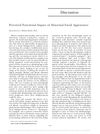 62 citations,
November 2009 in “Aging Cell”
62 citations,
November 2009 in “Aging Cell” Hedgehog signaling helps keep hair follicle stem cells the same in both young and old human skin.
 27 citations,
December 2013 in “Endocrinology”
27 citations,
December 2013 in “Endocrinology” Researchers created a mouse model for Cushing's syndrome to study glucocorticoid excess and potential treatments.
 6 citations,
September 2022 in “Frontiers in pharmacology”
6 citations,
September 2022 in “Frontiers in pharmacology” Epimedium extract helps increase skin pigmentation and could be a new treatment for conditions with reduced pigmentation.
 5 citations,
September 2019 in “ACS Applied Bio Materials”
5 citations,
September 2019 in “ACS Applied Bio Materials” The hydrogel with bioactive factors improves skin healing and regeneration.
 5 citations,
February 2015 in “New England journal of medicine/The New England journal of medicine”
5 citations,
February 2015 in “New England journal of medicine/The New England journal of medicine” The conclusion of the case is not provided in the summary.
 1 citations,
January 2023 in “Burns and trauma”
1 citations,
January 2023 in “Burns and trauma” Tiny particles from 3D-grown skin cells speed up wound healing by promoting blood vessel growth.
60 citations,
February 2015 in “Biomaterials” A surface with VEGF can specifically capture endothelial cells from flowing fluids.
37 citations,
April 2018 in “Journal of Allergy and Clinical Immunology” A mutation in the IKZF1 gene causes immune system overactivity, linked to autoimmune diseases like lupus.
36 citations,
July 2017 in “Journal of controlled release” A new method allows for controlled, long-lasting delivery of retinoic acid through the skin with fewer side effects.
 April 2024 in “Journal of translational medicine”
April 2024 in “Journal of translational medicine” MJ04, a new compound, effectively promotes hair growth and is a potential topical treatment for hair loss.
 May 2022 in “Gastroenterology”
May 2022 in “Gastroenterology” Targeting NETs may help reduce fibrosis in Crohn's disease.
 September 2018 in “Value in Health”
September 2018 in “Value in Health” Orphan drug benefit scores in Germany are influenced by phase III data and lack of alternatives, but not linked to price or discounts.

Social media data can help track and predict COVID-19 symptoms and trends.
 June 2023 in “Pharmaceuticals”
June 2023 in “Pharmaceuticals” Men and women respond differently to drugs for COVID-19, high cholesterol, and diabetes, which suggests a need for personalized treatments.
 May 2023 in “Reproductive Biology and Endocrinology”
May 2023 in “Reproductive Biology and Endocrinology” The internet has accurate information on Polycystic Ovarian Syndrome, but it's not high quality or easy to read, so we need better, user-friendly resources.
 September 2022 in “Plastic and Reconstructive Surgery”
September 2022 in “Plastic and Reconstructive Surgery” Baricitinib helps with severe hair loss, negative-pressure therapy lowers hernia recurrence, tranexamic acid reduces bleeding, robot-assisted breast surgery may improve outcomes, and acellular dermal matrix could decrease breast reconstruction complications.
Cows moving from tie-stall to free-stall housing had more heel problems, less joint lesions, and higher stress levels.
 1 citations,
January 2013 in “Springer eBooks”
1 citations,
January 2013 in “Springer eBooks” The document concludes that skin and nail changes can indicate various underlying health conditions.
 1 citations,
January 2022 in “MedieKultur: Journal of Media and Communication Research”
1 citations,
January 2022 in “MedieKultur: Journal of Media and Communication Research” YouTube is changing the way health-related advice is shared, altering traditional roles of experts and patients.
October 2020 in “Tierärztliche Praxis. Ausgabe Grosstiere, Nutztiere” Cows moving from tie-stalls to free-stalls had fewer leg injuries but more stress and heel horn erosions.
 7 citations,
April 2021 in “Journal of The American Academy of Dermatology”
7 citations,
April 2021 in “Journal of The American Academy of Dermatology” A new teledermatology system improved access and reduced wait times for skin care.
January 2014 in “프로그램북(구 초록집)” Platelet-rich plasma treatments help hair growth in people with hair loss by increasing certain cell growth and protein levels.
 June 2003 in “Plastic and Reconstructive Surgery”
June 2003 in “Plastic and Reconstructive Surgery” People with facial disfigurements are judged more negatively, highlighting the social benefits of corrective surgery.
 14 citations,
March 1995 in “Journal of cell science”
14 citations,
March 1995 in “Journal of cell science” SV40 T antigen in hair follicles causes abnormal hair and health issues in mice.
May 2010 in “Deleted Journal” PCOS causes menstrual issues, infertility, and long-term health risks.
 1 citations,
February 2024 in “npj digital medicine”
1 citations,
February 2024 in “npj digital medicine” Researchers improved a skin disease diagnosis model using online images, achieving up to 49.64% accuracy.
 127 citations,
January 2013 in “PLOS ONE”
127 citations,
January 2013 in “PLOS ONE” Probiotic bacteria improved skin and hair health in aged mice.
 3 citations,
January 2017 in “Journal of cosmetology & trichology”
3 citations,
January 2017 in “Journal of cosmetology & trichology” The nutritional supplement improved hair quality and reduced hair loss.
 1 citations,
January 2017 in “Social Science Research Network”
1 citations,
January 2017 in “Social Science Research Network” The document suggests creating a secure database for indigenous knowledge and recommends that the TKDL actively fight patents that slightly alter traditional knowledge.
 January 2024 in “İstanbul Kuzey Klinikleri”
January 2024 in “İstanbul Kuzey Klinikleri” Low ferritin levels are linked to increased hair loss; no link found between vitamin B12, TSH levels, and hair loss.























